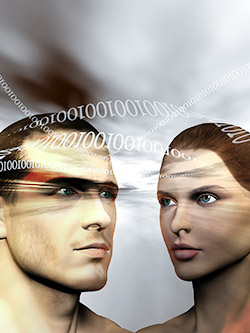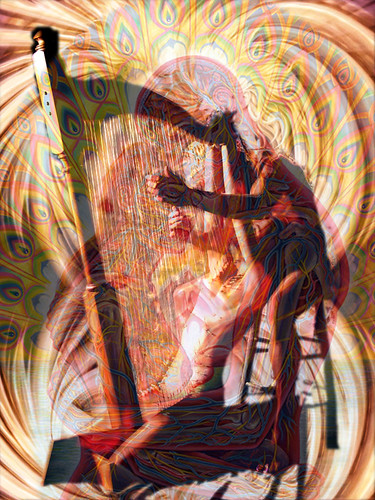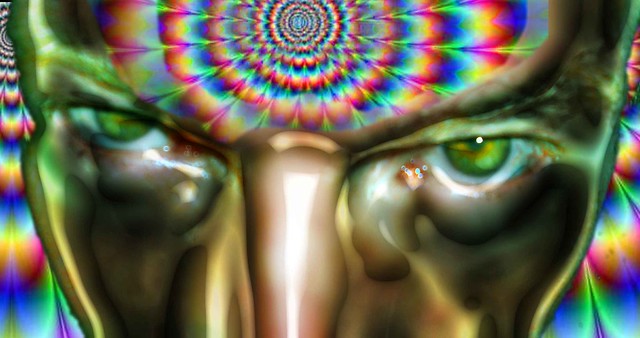Does Telepathy Conflict With Science?
Many are Starting to Think Not
By Chris
Carter
 Recently,
journalist Steven Volk was surprised to discover that leading skeptical
psychologist
Richard Wiseman has admitted that the evidence for telepathy is so good that
“by the standards of any other area of science, [telepathy] is proven.” Mr Volk
goes on to write, “Even more incredibly, as I report in Fringe-ology, another
leading skeptic, Chris French, agrees
with him.”
Recently,
journalist Steven Volk was surprised to discover that leading skeptical
psychologist
Richard Wiseman has admitted that the evidence for telepathy is so good that
“by the standards of any other area of science, [telepathy] is proven.” Mr Volk
goes on to write, “Even more incredibly, as I report in Fringe-ology, another
leading skeptic, Chris French, agrees
with him.”Mr Volk might even be more surprised to learn that back in 1951 psychologist Donald Hebb wrote this:
Why do we not accept ESP as a psychological fact? [J.B.] Rhine has offered enough evidence to have convinced us on almost any other issue… Personally, I do not accept ESP for a moment, because it does not make sense. My external criteria, both of physics and of physiology, say that ESP is not a fact despite the behavioural evidence that has been reported. I cannot see what other basis my colleagues have for rejecting it… Rhine may still turn out to be right, improbable as I think that is, and my own rejection of his view is – in the literal sense – prejudice. (emphasis added.)
Four years later, George Price, then a research associate at the Department of Medicine at the University of Minnesota, published an article in the prestigious journal Science that began:
“Believers in psychic phenomena… appear to have won a decisive victory and virtually silenced opposition.… This victory is the result of careful experimentation and intelligent argumentation. Dozens of experimenters have obtained positive results in ESP experiments, and the mathematical procedures have been approved by leading statisticians…. Against all this evidence, almost the only defense remaining to the skeptical scientist is ignorance.”
But Price then argued, “ESP is incompatible with current scientific theory,” and asked:
If, then, parapsychology and modern science are incompatible, why not reject parapsychology? …The choice is between believing in something “truly revolutionary” and “radically contradictory to contemporary thought” and believing in the occurrence of fraud and self-delusion. Which is more reasonable?
So, here we have two skeptics in effect admitting that if this were any other field of inquiry then the experimental data would have carried the day by 1950.
Like Price and Hebb before them, both Wiseman and French hold that the claim of telepathy is so extraordinary that we need a greater level of evidence than we normally demand. Why should this be so? Most people believe in the reality of telepathy based on their own experiences, and are puzzled by the description of telepathy as “extraordinary.”
It is even more puzzling when surveys show that a large proportion of scientists accept the possibility telepathy exists. Two surveys of over 500 scientists in one case and over 1,000 in another found that the majority of respondents considered ESP “an established fact” or “a likely possibility”: 56 percent in one and 67 percent in the other.
Polls such as this suggest that most scientists are curious and open-minded about psi. This, however, does not seem to be the case in one field: psychology. In the former study only 3 percent of natural scientists considered ESP “an impossibility,” compared to 34 percent of psychologists. In fact, the most prominent skeptics of psychic abilities today – such as Wiseman, French, James Alcock, Susan Blackmore, and Ray Hyman – are psychologists. An exception is biologist Richard Dawkins, but like Wiseman and French, he is also on record as saying the existence of telepathy would “turn the laws of physics upside down.”
Psychologist James Alcock recently wrote that the claims of parapsychology “stand in defiance of the modern scientific worldview. That by itself does not mean that parapsychology is in error, but as the eminent neuropsychologist Donald Hebb pointed out, if the claims of parapsychology prove to be true, then physics and biology and neuroscience are horribly wrong in some fundamental respects.”
But neither Alcock, Hebb, Wiseman nor French ever bother to explain how the claims of parapsychology “stand in defiance” of science, or how “physics and physiology say that ESP is not a fact.” Indeed, it is rare for a skeptic to ever back up this claim with specific examples. As I show in my book Science and Psychic Phenomena, on those rare occasions they do, they invariably invoke the principles of classical physics, which have been known to be fundamentally incorrect for more than three quarters of a century.
However, a number of leading physicists such as Henry Margenau, David Bohm, Brian Josephson, and Olivier Costra de Beauregard have repeatedly pointed out that nothing in quantum mechanics forbids psi phenomena. Costra de Beauregard even maintains that the theory of quantum physics virtually demands psi phenomena exist. And physicist Evan Harris Walker has developed a theoretical model of psi based upon von Neumann’s formulation of quantum mechanics.
Ray Hyman’s 1996 argument (in the Skeptical Inquirer) that the acceptance of psi would require we “abandon relativity and quantum mechanics in their current formulations” is thereby shown to be nonsense. Contrast Hyman’s statement with that of theoretical physicist Costa de Beauregard, who has written “relativistic quantum mechanics is a conceptual scheme where phenomena such as psychokinesis or telepathy, far from being irrational, should, on the contrary, be expected as very rational.”
 As mentioned
earlier, adherence to an outmoded metaphysics of science seems much more
prevalent among psychologists than physicists. Skeptics such as psychologist
Susan Blackmore are fond of saying that the existence of psi is incompatible
“with our scientific worldview” – but with which
scientific worldview? Psi is certainly incompatible with the old scientific
worldview, based on Newtonian mechanics and behaviourist psychology. It is not
incompatible with the emerging scientific worldview based upon quantum
mechanics, the neurosciences, and cognitive psychology.
As mentioned
earlier, adherence to an outmoded metaphysics of science seems much more
prevalent among psychologists than physicists. Skeptics such as psychologist
Susan Blackmore are fond of saying that the existence of psi is incompatible
“with our scientific worldview” – but with which
scientific worldview? Psi is certainly incompatible with the old scientific
worldview, based on Newtonian mechanics and behaviourist psychology. It is not
incompatible with the emerging scientific worldview based upon quantum
mechanics, the neurosciences, and cognitive psychology.Even before quantum mechanics began to supersede classical mechanics in the 1920s, many physicists were much more open to investigating psi phenomena than most psychologists seem today. An astonishing number of the most prominent physicists of the 19th century expressed interest in psychic research, including: William Crookes, inventor of the cathode ray tube, used today in televisions and computer monitors; J.J. Thomson, who won the Nobel Prize in 1906 for the discovery of the electron; and Lord Rayleigh, considered one of the greatest physicists of the late 19th century, and winner of the Nobel Prize in physics in 1904.
Of course, for their efforts in investigating these and other unusual phenomena, these men were often criticised and ridiculed mercilessly by their colleagues.
But modern physics is very different from the classical physics of the 19th century, and it is time the skeptical psychologists realised this. The great psychologist Gardner Murphy, president of the American Psychological Association, and later of the American Society for Psychical Research, urged his fellow psychologists to become better acquainted with modern physics:
…the difficulty is at the level of physics, not at the level of psychology. Psychologists may be a little bewildered when they encounter modern physicists who take these phenomena in stride, in fact, take them much more seriously than psychologists do, saying, as physicists, that they are no longer bound by the types of Newtonian energy distribution, inverse square laws, etc., with which scientists used to regard themselves as tightly bound…. psychologists probably will witness a period of slow, but definite, erosion of the blandly exclusive attitude that has offered itself as the only appropriate scientific attitude in this field. The data from parapsychology will be almost certainly in harmony with general psychological principles and will be assimilated rather easily within the systematic framework of psychology as a science when once the imagined appropriateness of Newtonian physics is put aside, and modern physics replaces it.
Sources
J.E. Alcock, Parapsychology: Science or Magic?, New York:
Pergamon, 1981
J.E. Alcock, “Parapsychology: the Spiritual Science”, Free Inquiry, 5 (2),
1985, 25-35
Olivier Costa de Beauregard, “Quantum Paradoxes and Aristotle’s Twofold
Information Concept,” in Laura Oteri, editor, Quantum Physics and Parapsychology (New York:
Parapsychology Foundation, 1975), 91-102
Olivier Costa de Beauregard, “The Expanding Paradigm of the Einstein Theory”,
in A. Puharich, editor, The
Iceland Papers (Amherst: Essentia Research Associates, 1979),
161-191
Christopher Evans, “Parapsychology – what the questionnaire revealed”, New Scientist, 25, January
1973, 209
Hyman, The Evidence for Psychic Functioning: Claims vs. Reality, Skeptical Inquirer,
March/April 1996, 24-26
George R. Price, “Science and the Supernatural”, Science, Volume 122, number 3165, August
1955, 359-367
Mahlon Wagner & Mary Monet, “Attitudes of College Professors Toward
Extra-Sensory Perception,” Zetetic
Scholar, 1979, 5, 7-16
E.H. Walker, “The Quantum Theory of Psi Phenomena”, Psychoenergetic Systems, Vol. 3, 1979,
259-299
CHRIS CARTER was educated at Oxford University and is the author of Science and the Near-Death Experience: How Consciousness Survives Death, Science and Psychic Phenomena: The Fall of the House of Skeptics and Science and the Afterlife Experience Evidence for the Immortality of Consciousness (released August 2012). Books are published by Inner Traditions (www.innertraditions.com) and available from all good bookstores.
The above article appeared in New
Dawn Special Issue Vol 6 No 4
© New Dawn Magazine and the respective
author.
For our reproduction notice, click here.
For our reproduction notice, click here.
From New Dawn @ http://www.newdawnmagazine.com/articles/does-telepathy-conflict-with-science-many-are-starting-to-think-not
For more information about telepathy see http://nexusilluminati.blogspot.com/search/label/telepathy
- Scroll down
through ‘Older Posts’ at the end of each section
Hope you like this
not for profit site -
It takes hours of work every day by
a genuinely incapacitated invalid to maintain, write, edit, research,
illustrate and publish this website from a tiny cabin in a remote forest
Like what we do? Please give anything
you can -
Contribute any amount and receive at
least one New Illuminati eBook!
(You can use a card
securely if you don’t use Paypal)
Please click below -
Spare Bitcoin
change?
Xtra Images by R. Ayana – https://c2.staticflickr.com/4/3717/19846647702_26517ec3fd_h.jpg
For further enlightening
information enter a word or phrase into the random synchronistic search box @
the top left of http://nexusilluminati.blogspot.com
And see
New Illuminati – http://nexusilluminati.blogspot.com
New Illuminati on Facebook - https://www.facebook.com/the.new.illuminati
New Illuminati Youtube Channel - https://www.youtube.com/user/newilluminati/playlists
New Illuminati’s OWN Youtube Videos
-
New Illuminati on Google+ @ For
New Illuminati posts - https://plus.google.com/u/0/+RamAyana0/posts
New Illuminati on Twitter @ www.twitter.com/new_illuminati
New Illuminations –Art(icles) by
R. Ayana @ http://newilluminations.blogspot.com
The Her(m)etic Hermit - http://hermetic.blog.com
DISGRUNTLED SITE ADMINS PLEASE NOTE –
We provide a live link to your original material on your site (and
links via social networking services) - which raises your ranking on search
engines and helps spread your info further!
This site is published under Creative Commons (Attribution) CopyRIGHT
(unless an individual article or other item is declared otherwise by the copyright
holder). Reproduction for non-profit use is permitted
& encouraged - if you give attribution to the work & author and include
all links in the original (along with this or a similar notice).
Feel free to make non-commercial hard (printed) or software copies or
mirror sites - you never know how long something will stay glued to the web –
but remember attribution!
If you like what you see, please send a donation (no amount is too
small or too large) or leave a comment – and thanks for reading this far…
Live long and prosper! Together we can create the best of all possible
worlds…
From the New Illuminati – http://nexusilluminati.blogspot.com

No comments:
Post a Comment
Add your perspective to the conscious collective